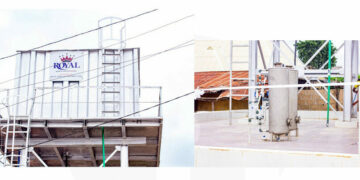Picture a bustling marketplace in Lagos. Traders shout out their prices, customers haggle, and transactions happen in cash. It is a trust-based system that lacks efficiency, transparency, and security. Imagine a future where every transaction is recorded in a digital ledger, accessible to all, and immune to fraud. This is the promise of blockchain technology—a tool that could redefine Africa’s financial landscape.
Bridging the Financial Gap
Across Africa, millions remain excluded from traditional banking systems. According to the World Bank, over 66% of people in Sub-Saharan Africa are unbanked, meaning they have no access to essential financial services. While mobile money services like Kenya’s M-Pesa have improved financial inclusion, challenges persist, particularly with cross-border transactions.
Blockchain technology can fill this gap by eliminating intermediaries and facilitating direct transactions. A good example is BitPesa, a blockchain-based payment system that enables seamless business payments across borders. Through such innovations, a trader in Accra can purchase goods from a supplier in Lagos without excessive transaction fees, delays, or the need for a traditional bank account.
Beyond Cryptocurrency: Blockchain in Agriculture, Trade, and the Creative Economy
Many associate blockchain with cryptocurrencies like Bitcoin, but its applications extend far beyond digital currencies. For instance, blockchain is already making a difference in the agricultural sector. Small-scale farmers often struggle with access to fair markets and transparent pricing.
Blockchain-powered platforms, such as Agrocenta in Ghana, connect farmers directly with buyers, ensuring fair pricing and reducing middlemen exploitation. The technology also helps track food supply chains, verify the authenticity of seeds, and ensure quality standards. With blockchain, a farmer in Kano can trace where his produce is going and negotiate fair prices without fear of being shortchanged.
Beyond agriculture, blockchain is also reshaping Africa’s booming creative industry. Musicians, filmmakers, and digital artists struggle with piracy and unfair royalty distribution. Blockchain-based smart contracts can ensure that content creators receive fair compensation for their work, enabling Nigerian musicians and Nollywood filmmakers to monetise their art globally without intermediaries taking a significant cut.
The eNaira and the Future of Digital Currencies
Nigeria took a bold step by launching the eNaira, the country’s digital currency, to promote cashless transactions. However, adoption has been slow, largely due to a lack of awareness and trust.
For digital currencies to work, they must provide tangible benefits over existing systems. Integrating digital currencies like the eNaira with popular mobile money platforms could increase usage. Imagine sending money across African countries instantly, with minimal fees and no need for a bank account. That is the kind of convenience blockchain-based digital currencies can offer.
Empowering the Next Generation: Blockchain and Youth Employment
With Africa’s large youth population, blockchain presents a unique opportunity for economic empowerment. Decentralised finance (DeFi) platforms offer access to loans, investments, and savings without traditional banks. Young Nigerians skilled in blockchain technology already leverage it to create decentralised applications (dApps) and participate in the global gig economy.
By investing in blockchain education, universities and tech hubs can equip the next generation with skills that will be in high demand globally, fostering economic independence and innovation.
Fighting Corruption with Transparency
Corruption has long hindered Africa’s economic progress, eroding public trust and stalling development. Blockchain’s ability to create transparent, tamper-proof records makes it a powerful tool for governance and accountability.
In Sierra Leone, blockchain technology was tested in elections to enhance transparency and prevent voter fraud. Similar innovations could make electoral processes across Africa more credible and secure if widely adopted. Likewise, blockchain can ensure that public funds are tracked efficiently, reducing the risk of embezzlement and financial mismanagement.
Governments can also use blockchain for identity management, land registry, and tax collection. In Nigeria, integrating blockchain with the National Identification Number (NIN) system could improve identity verification and reduce fraud in financial transactions.
Unlocking Cross-Border Trade with Blockchain
Africa is working towards economic integration through the African Continental Free Trade Area (AfCFTA), which aims to create a unified market. However, cross-border trade remains expensive and complicated due to different currencies, payment systems, and bureaucratic bottlenecks.
Blockchain-powered payment solutions like those developed by Flutterwave enable businesses to transact across Africa using digital assets or stablecoins. These solutions simplify payments, cut transaction costs, and allow small businesses to expand beyond borders. With blockchain, an SME in Abuja can easily sell its products to customers in Johannesburg or Nairobi.
Challenges to Blockchain Adoption in Africa
Despite its potential, blockchain adoption in Africa faces hurdles. Regulatory uncertainty, limited internet access, and lack of understanding about the technology remain major challenges.
Governments must establish clear policies that encourage blockchain innovation while protecting consumers. More importantly, widespread education and awareness campaigns are needed to help businesses and individuals see blockchain as a solution rather than a complex, abstract concept.
A Look into the Future
Blockchain technology could become a mainstream tool for economic transformation in Africa in the next decade. We can expect:
Policy Reforms: More African governments are developing regulations to support blockchain-based solutions.
Industry Integration: Various sectors, including finance, healthcare, agriculture, and creative industries, leveraging blockchain for improved efficiency.
Empowered Individuals: Citizens gain more control over their financial transactions, personal data, and governance.
Africa is at a defining moment. While blockchain is not a magic solution to all economic challenges, it offers a chance to bypass traditional barriers and create a more transparent, efficient, and inclusive economic system. If embraced strategically, this technology could be a game-changer for the continent.





